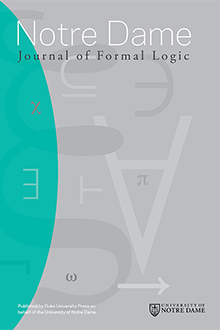Abstract
The sequential form of a statement
is the statement
There are many classically true statements of the form (†) whose proofs lack uniformity, and therefore the corresponding sequential form is not provable in weak classical systems. The main culprit for this lack of uniformity is of course the law of excluded middle. Continuing along the lines of Hirst and Mummert, we show that if a statement of the form (†) satisfying certain syntactic requirements is provable in some weak intuitionistic system, then the proof is necessarily sufficiently uniform that the corresponding sequential form is provable in a corresponding weak classical system. Our results depend on Kleene’s realizability with functions and the Lifschitz variant thereof.
Citation
François G. Dorais. "Classical Consequences of Continuous Choice Principles from Intuitionistic Analysis." Notre Dame J. Formal Logic 55 (1) 25 - 39, 2014. https://doi.org/10.1215/00294527-2377860
Information





